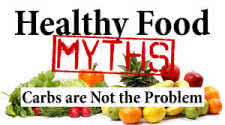Debunking the "Carbs Are Bad For You" Weight Loss Myth

Do you really need to avoid carbs?
The "carbs are bad" theory has recently migrated from obscure bookstore shelves and Internet sites to mainstream publications such as Prevention. Some health professionals are
now recommending that we limit our consumption of most breads, muffins, crackers and pasta. Depending on individual concerns outlined in this article, a bodybuilder may choose
to heed these warnings or decide that they aren't applicable.
To clarify, "bad" carbs are not vegetables, fruit or whole grains such as oatmeal; rather, they're obvious sources such as candy and cookies, and refined and processed products
like many breads, white rice and most crackers. These products can originate from whole grains, but parts of the grain kernel are removed to form, for example, regular wheat
or white bread. (Breads are considered refined unless the label specifically lists a whole grain as the first ingredient.)
A high intake of refined carbs seems to be linked to disorders such as heart disease, diabetes, colon cancer, breast cancer, obesity and musculoskeletal problems. Many of these
findings are based on epidemiological research, meaning that a surveyed group with certain habits such as a diet high in whole grains showed less risk for certain diseases. Do
the fiber, vitamins and phytochemicals in whole grains have a preventative effect; or does the lack of those nutrients in diets low in whole grains have a negative effect? Or,
does the preventative effect actually come from other factors, such as a lifestyle that goes along with higher consumption of whole grains? At this time, research doesn't
definitively explain the correlations, but there are clear-cut health benefits to eating "closer to nature." A bodybuilder's choice to avoid certain carbs because of links to
disease will depend on many factors, including lifestyle as a whole and genetic predispositions.
Insulin resistance, or sugar sensitivity, in which a person's body doesn't handle carbs optimally, is, perhaps, another reason to reduce refined-carb intake. You probably don't
have to worry about sugar-linked moodiness or weight gain if you don't experience symptoms such as cravings, emotional attachments to carbs, or a depletion of energy after eating
a carb-rich meal. If, however you feel rotten after a plate of pasta, you might try whole grains rather than the processed version.
Upon learning of all the "bad carbs," you might be tempted to go low-carb on a daily basis. This is not a good idea for most bodybuilders. There's a saying in fitness that " fat
burns in the flame of carbohydrate."
To efficiently burn fat, you need carbs to fuel the fire. So if you're trying to lean out and gain muscle, you want carbs for energy and to make gains possible. Cutting carbs
makes it that much harder to get the calories you need for adding mass.
Whole grains have much more to offer nutritionally than white bread. Of course, white bread and regular pasta both provide energy in the form of calories; they're also valuable
for athletes prior to competition (as bulky whole grains can cause stomach problems during an event) and for post exercise glycogen replacement. Overall, whole grains offer myriad
health benefits and higher levels of fiber, vitamins and minerals than their refined counterparts; generally, those things make them a wiser choice, nutritionally speaking.
For bodybuilders reducing their carbs in a cutting phase, eating whole-grain carbs could help with overall nutrition and well-being. When you cut calories from carbs, you're
also cutting out their nutritional benefits. Instead of a water bagel or a white hamburger bun, try the whole wheat versions, so you'll power up the remaining reduced amount of
carbs.